英语专业英国文学史课件Sir Gawain and the GreenKnight PPT
- 格式:ppt
- 大小:1.83 MB
- 文档页数:43
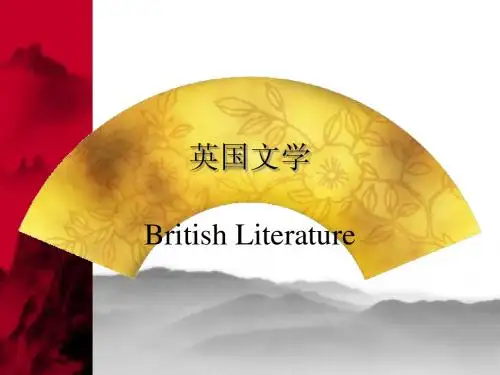
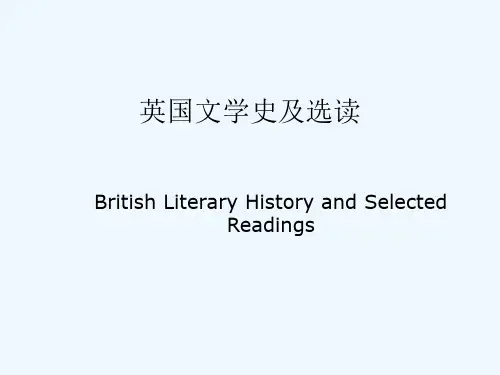
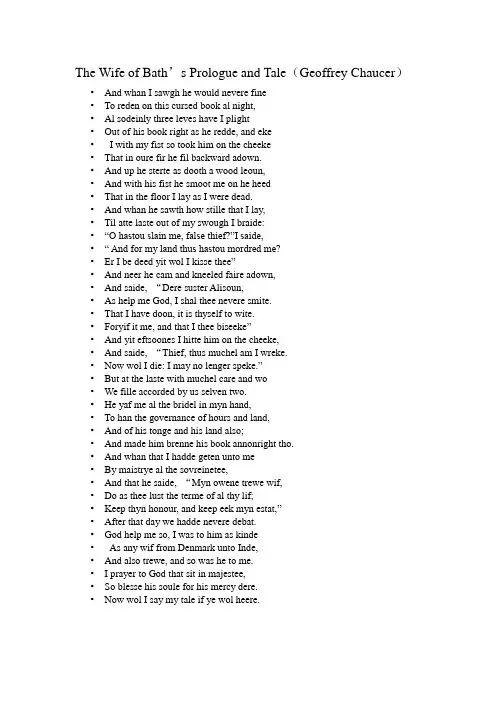
The Wife of Bath’s Prologue and Tale(Geoffrey Chaucer)•And whan I sawgh he would nevere fine•To reden on this cursed book al night,•Al sodeinly three leves have I plight•Out of his book right as he redde, and eke•I with my fist so took him on the cheeke•That in oure fir he fil backward adown.•And up he sterte as dooth a wood leoun,•And with his fist he smoot me on he heed•That in the floor I lay as I were dead.•And whan he sawth how stille that I lay,•Til atte laste out of my swough I braide:•“O hastou slain me, false thief?”I saide,•“ And for my land thus hastou mordred me?•Er I be deed yit wol I kisse thee”•And neer he cam and kneeled faire adown,•And saide, “Dere suster Alisoun,•As help me God, I shal thee nevere smite.•That I have doon, it is thyself to wite.•Foryif it me, and that I thee biseeke”•And yit eftsoones I hitte him on the cheeke,•And saide, “Thief, thus muchel am I wreke.•Now wol I die: I may no lenger speke.”•But at the laste with muchel care and wo•We fille accorded by us selven two.•He yaf me al the bridel in myn hand,•To han the governance of hours and land,•And of his tonge and his land also;•And made him brenne his book annonright tho.•And whan that I hadde geten unto me•By maistrye al the sovreinetee,•And that he saide, “Myn owene trewe wif,•Do as thee lust the terme of al thy lif;•Keep thyn honour, and keep eek myn estat,”•After that day we hadde nevere debat.•God help me so, I was to him as kinde•As any wif from Denmark unto Inde,•And also trewe, and so was he to me.•I prayer to God that sit in majestee,•So blesse his soule for his mercy dere.•Now wol I say my tale if ye wol heere.paradise lostOf man’s first disobedience, and the fruitOf that forbidden tree whose mortal taste Brought death into the world, and all our woe, With loss of Eden, till greater ManRestore us, and regain the blissful seat,Sing, Heavenly Muse, that on the secret topOf Oreb, or of Sinai, didst inspireThat shepherd who first taught the chosen seedIn the beginning how the heavens and earth Rose out Chaos: or, if Sion hillDelight thee more, and Siloa’s brook that flowed Fast by the oracle of God, I thenceInvoke thy aid to my adventurous song,That with no middle flight intends to soarAbove th’ Aonian mount, while it pursues Things unattempted yet I prose or rhyme.And chiefly thou, O’Spirit, that dost prefer Before all temples th’upright heart and pure, Instruct me, for thou know’st, thou from the first Wast present, and with mighty wings outspread Dovelike sat’st brooding on the vast abyss,And mad’st pregnant what in me is dark Illumine; what is low, raise and support;That to the height of this great argumentI may assert Eternal Providence,And justify the ways of God to men.Say first (for Heaven hides nothing from thy view, Nor the deep tract of Hell), say first what cause Moved our grand parents, in that happy state, Favored of Heaven so highly, to fall offFrom their Creator, and transgress his willFor one restraint, lords of the world besides? Who first seduced them to that foul revolt?High on a throne of royal state, which far Outshone the wealth of Ormus and of IndOr where the gorgeous East with richest hand Showers on her kings barbaric pearl and gold, Satan exalted sat, by merit raisedTo that bad eminence, and from despairThus high uplifted beyond hope, aspireBeyond thus high, insatiate to pursueVain war with Heaven; and by success untaught, His proud imaginations thus displayed: “Powers and dominions, deities of Heaven!For since no deep within her gulf can hold Immortal vigor, though oppressed and fallen,I give not Heaven for lost: from the descent Celestial virtues rising will appearMore glorious and more dread than from no fall, And trust themselves to fear no second fate.Me though just right and the fixed laws of Heaven Did first create your leader, next, free choice, With what besides, in council or in fight,Hath been achieved of merit, yet this lossThus far at least recovered, hath much more Established in a safe unenvied throneYielded with full content. The happier stateEnvy from each inferior; but who hereWill envy whom the highest place exposes Foremost to stand against the Thunderer’s aim, Your bulwark, and condemns to greatest shareOf endless pain? Where there is then no goodFor which to strive, no strife can grow up there From faction; for none sure will claim in Hell Precedence, none, whose portion is so smallWill covet more. With this advantage thenTo claim our just inheritance of old,Surer to prosper than prosperityCould have assured us; and by what best way, Whether of open war or convert guileWe now debate; who can advise, may speak.”Sir Gawain and the Green KnightSir Gawain was Arthur’s nephew. In English stories, he is always described as a brave, honest and loyal knight.According to the story, King Arthur and his Round Table Knights were holding their New Year’s banquet at Camelot when a tall knight dressed in green and riding on a green horse came in, holding a huge axe in his hand. He challenged a knight to cut his head off on condition that the knight agreed to have his head cut off a year after. Gawain accepted the challenge and cut off the Green Knight’s head.. The knight picked up his head and rode away.Soon after that, Gawain set off to look for the Green Knight to receive his cut. After going through many strange adventures, on Christmas Eve Gawain came upon a beautiful castle where he was well entertained. He agreed to stay on till New Year’s Day since he was told that the Green Knight lived nearby. The lord of the castle made an agreement with Gawain that each day he himself would go hunting, and Gawain stay in the castle, and in the evening they would exchange what they had got during the day.For three days the lord went hunting but Gawain had to resist the temptation of the beautiful lady of the castle, who gave him one kiss on the first day, two on the second, and on the third day three kisses and a girdle which had magic power and would save his life. Each evening Gawain exchanged the kisses with his host for animals killed in the hunt; but on the third evening he kept the girdle, thinking that it would protect him when he met the Green Knight and received the cut. In this way he broke his promise.On the New Year’s Day, Gawain was brought to the Green Knight. He bent over for the cut he had promised to accept. The Green Knight raised his axe and brought it down, but he stopped himself at the last moment, for Gawain had moved a little because of fear. The Green Knight laughed at him. Gawain got ashamed and angry and urged the Green Knight to finish his job quickly. The Green Knight lifted his axe to cut, but again held it in the air. He praised Gawain for not moving this time. The third time the Green Knight made a slight cut in Gawain’s neck. Then he explained that he was the lord of the castle in a different form, and that the cut in the neck had been made because Gawain was full of shame and threw the girdle away. But the Green Knight forgives him and gave him the girdle as a gift.高文爵士是亚瑟王的外甥。
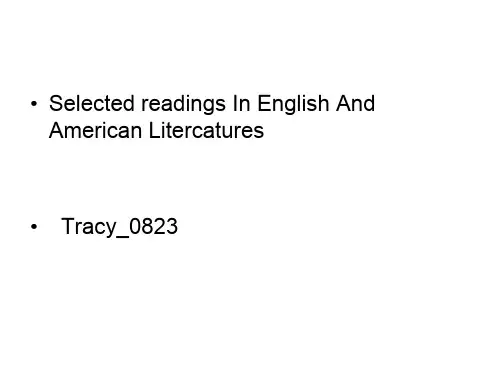
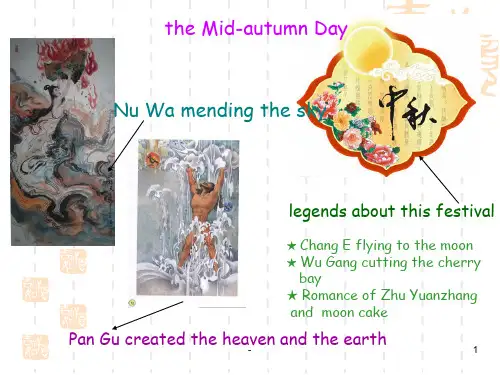
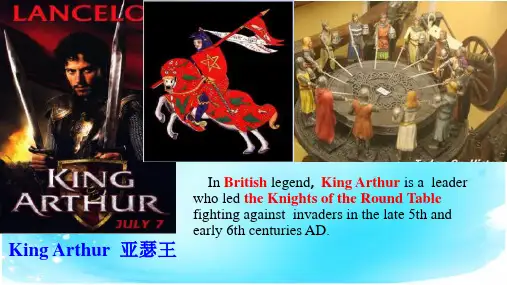
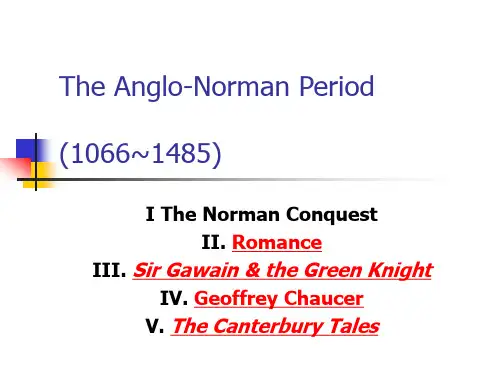
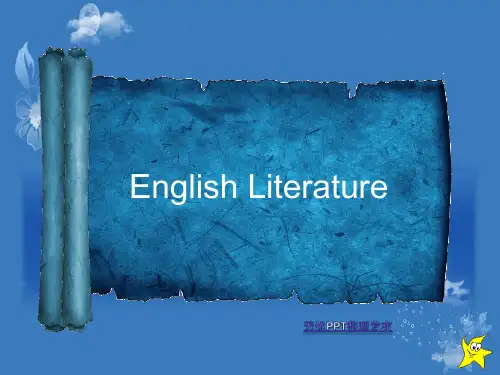
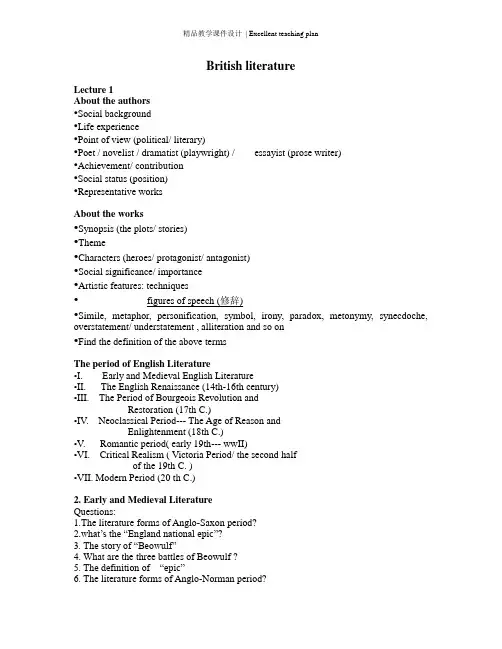
British literatureLecture 1About the authors•Social background•Life experience•Point of view (political/ literary)•Poet / novelist / dramatist (playwright) / essayist (prose writer) •Achievement/ contribution•Social status (position)•Representative worksAbout the works•Synopsis (the plots/ stories)•Theme•Characters (heroes/ protagonist/ antagonist)•Social significance/ importance•Artistic features: techniques•figures of speech (修辞)•Simile, metaphor, personification, symbol, irony, paradox, metonymy, synecdoche, overstatement/ understatement , alliteration and so on•Find the definition of the above termsThe period of English Literature•I. Early and Medieval English Literature•II. The English Renaissance (14th-16th century)•III. The Period of Bourgeois Revolution andRestoration (17th C.)•IV. Neoclassical Period--- The Age of Reason andEnlightenment (18th C.)•V. Romantic period( early 19th--- wwII)•VI. Critical Realism ( Victoria Period/ the second halfof the 19th C. )•VII. Modern Period (20 th C.)2. Early and Medieval LiteratureQuestions:1.The literature forms of Anglo-Saxon period?2.what’s the “England national epic”?3. The story of “Beowulf”4. What are the three battles of Beowulf ?5. The definition of “epic”6. The literature forms of Anglo-Norman period?7. What is “romance”?8.The class feature of the RomanceEpic (Heroic Poetry): This term is applied to great and lengthy narrative poems describing some important national enterprise or the adventures of distinguished heroes. (史诗)eg:Homer Odyssey《奥德赛》Dante’s Divine Comedy《十日谈》Milton Paradise Lost《失乐园》Romance: it was a long composition, sometimes in verse, sometimes in prose, describing the life and adventures of a noble hero.Class Feature of the Romance: the theme of loyalty to king and lord was repeatedly emphasized in romances, as loyalty was the corner-stone of feudal morality, without which the whole structure of feudalism would collapse.Sir Gawain and Green Knight 《高文爵士和緑衣骑士》3. ChaucerLife:⏹Born in a middle-classfamily in London⏹Is said to have studied atOxford and Cambridge⏹Became a man of affaires, undertaking various diplomatic missions to the Continent as courtier, diplomat and civil servant⏹Died in 1400,buried in Westminster Abbey, there established the poets’ corner Westminster Abbey (西敏寺)⏹An Abbey of monk on the bank of the Thames. The state church in England.⏹It was destroyed and rebuilt several times.⏹Chaucer w as first buried in the Abbey, then established “Poets’ corner”.⏹It is an honor for a poet or his monument to be buried there.Literary Career:⏹His experience gave him chance to obtain a good knowledge of Latin, French and Italian.⏹Three periods:The first period consists of works translated from French, as “The Romaunt of the Rose”The second consists of works adapted from the Italian, as “Troilus and Criseyde.”(based on Boccacio’s poem Filostrato)The third includes “The Canterbury Tales”, which is purely English.⏹Translator⏹“The father (founder) of English poetry” -- John Dryden⏹“Founder of English realism” -- GorkyThe first short-story teller and first morden poet in E.L.Forerunner of humanismThe City Canterbury⏹Canterbury is a city and metropolitan district in Kent England, and an important Romantown.⏹The capital of the Saxon Kingdom of Kent.The Canterbury Tales 《坎特伯雷故事集》⏹A collection of stories⏹Pilgrim, pilgrimage⏹The Tabard Inn, a tavern in Southwark, near London.⏹A gigantic plan of 124 stories, but only 24 were written.⏹The verse models Boccaccio’s Decameron in formThe Prologue (楔子)⏹A prologue is an introduction or preface, often in verse, to a literary work, esp. a play ⏹The prologue provides a framework for the tales. There is an intimate connection between the tale and the prologue, both complementing each other.The Gneral Prologue (the original version)Whan that Aprill, with his shoures sooteThe droghte of March hath perced to the roote,And bathed every veyne in swich licourOf which vertu engendred is the flour;Whan zephirus eek with his sweete breethInspired hath in every holt and heethThe tendre croppes, and the yonge sonneHath in the Ram his halve cours yronne,And smale foweles maken melodye.Heroic Couplet (Iambic pentameter英雄双韵体⏹A pair of rhymed lines of verse of equal length, in the form of ten syllables and five stresses in each line. It was first used by Chaucer. Its master is Alexander Pope.⏹Alliteration(头韵)An alliterative verse, certain accented words in a line begin the same consonants sound. Alliteration is the opposite of rhyme by which the similar sounds occur at the end of the syllables.Contribution⏹He presents a panoramic picture of English life in the Middle Ages.⏹He brought a realistic tone to English literary creation. All his characters are true to life ⏹He introduced Rhymed stanzas, instead of the old Anglo-Saxon (alliterative verse)⏹He first wrote in the current English form of the time. His poetry is acknowledged as the literary language of the country, which is usually called middle English.The language of Chaucer⏹Middle English --- is closer to Old English, the language of the Anglo-Saxons, and Norman French, the language of William the ConquerorFeatures in Chaucer’s writing⏹Rhymed stanzas of various type⏹Simplicity in characterization⏹Satirical and humorous tone⏹narrativeAbout the prioress⏹Higher orders of the religious group⏹Speaks French-- the aristocratic language⏹Tenderness, pity, gentility⏹Overly concern about her personal appearance ⏹Satiric tone。
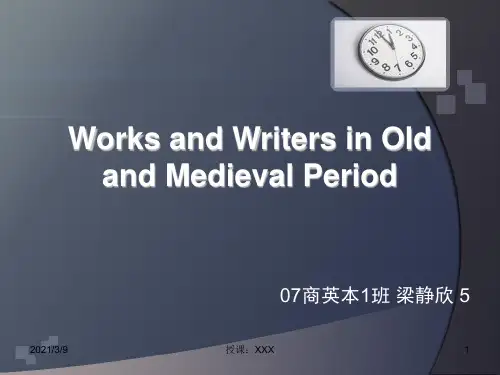
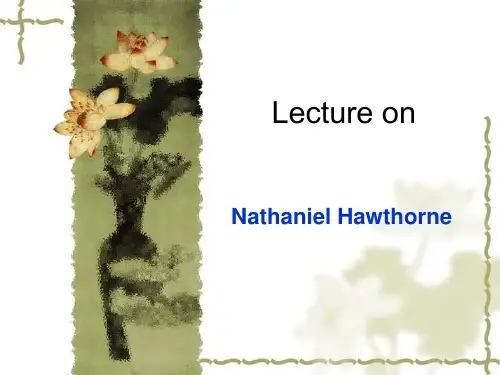
2023年《英国文学史及选读》(吴伟仁著)课后答
案
《英国文学史及选读》(吴伟仁著)内容简介
PART I THE ANGLO-SAXON PERIOD
Beowulf
PART II THE ANGLO-NORMAN PERIOD
Sir Gawain and the Green Knight
PART III GEOFFREY CHAUCER
The Canterbury Tales
(General Prologue)
Popular Ballads
Robin Hood and Allin-a-Dale
Get Up and Bar the Door
Sir Patrick Spens
PART IV THE RENAISSANCE
PART V THE 17TH CENTURY
PART VI THE 18TH CENTURY
《英国文学史及选读》(吴伟仁著)目录
本书是作者根据英国文学历史的`顺序结合作品选读所编写的一套适合我国高等教院校英语专业使用的教材。
由于课时有限,历史部分只作了简明扼要的概述,作品选读部分,尽可能遴选了文学史上的重要作家和重要作品。
这部“史”、“选”结合的教材,分为两册出版,第一册是古代至18世纪英国文学,第二册是19划纪至20世纪英国文学。
教材内容丰富,观点正确,选文具有代表性,可作高校外文系英语专业英国文学史和文学作品选读课程的课本或参考书,也是广大中学英语教师及具有一定程度的英语自学者和英美文学爱好者进修的理想读物。